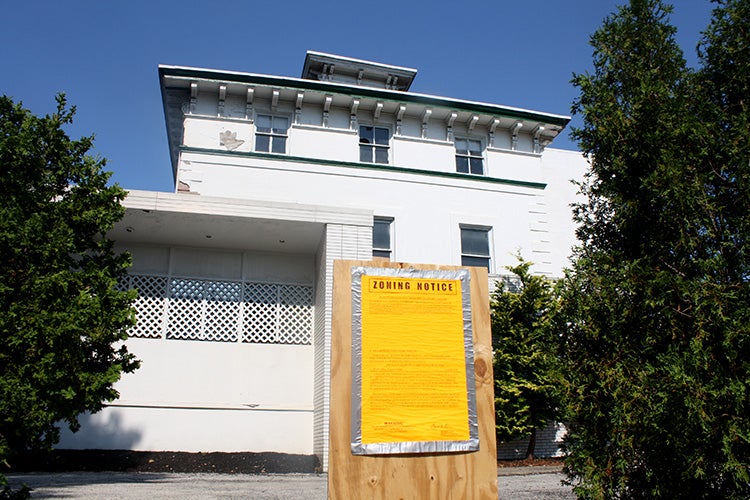Case of the mansion at 40th & Pine inches forward at L&I Review Board

At this rate, the Italianate mansion at 40th and Pine may fall down on its own before the University of Pennsylvania can demolish it and build anything new in its place.
The fate of the building is currently in the hands of the Board of L&I Review, which is hearing an appeal from community residents of a May decision by the Historical Commission to grant a financial hardship to Penn allowing them to demolish it. Penn has chosen developer Jonathan Weiss to build a five-story, 122-unit building geared toward graduate student housing on the lot.
But some community residents, represented by attorney Paul Boni, argue that the hardship was granted in error, and want the Board to overturn the Historical Commission’s decision. The Board has held a series of hearings on the issue. A few weeks ago, it ruled that the residents have standing to appeal the case, rejecting a motion to dismiss the appeal filed by Penn’s lawyer Matthew McClure, of Ballard Spahr.
The Board held another hearing on Tuesday to determine whether to issue subpoenas, per Boni’s request, to compel members of the Historical Commission to testify and to obtain other documents. The Board ultimately decided to allow Boni to see some of the documents he would have presented, to decide which ones are relevant, and to go from there. The board rejected his other requests for subpoena, such as those seeking Historical Commission testimony.
McClure, along with Andrew Ross of the Law Department, argued that Boni had no right to issue subpoenas, and that only the Board had that right. McClure and Ross characterized Boni’s requests as an unspecific “fishing expedition.” They said that Boni was trying to reargue the case they say he failed to make originally before the Historical Commission by bringing in new evidence before the L&I Review Board. And they argued that the Board should defer to the expertise of the Commission, and simply decide whether it made a gross error in granting the hardship.
Boni says that the University of Pennsylvania did not make a good faith effort to show that the building was unsuitable for reuse for before seeking the hardship. While they managed to show that it was not reusable for their own purposes, Boni says they need to show that it is not useful to anyone before getting a hardship.
“It can’t go to the market in a ridiculous way,” Boni said.
He was seeking documents related to Penn’s efforts to sell the building for reuse, which he said would show whether the building could be renovated, and how much renovation would cost. After a hearing of about 90 minutes, the Board made a decision, which was announced by board member Gary Lee.
Lee said that Boni could access four documents:
- A condition assessment of the property performed in 2002 by URS Corporation
- Findings of an adaptive reuse study carried out by BWA Architecture + Planning
- A Solicitation of Interest (SOI) issued by Penn in 2006, and proposals submitted in response
- Responses to another SOI issued in 2010
The Board ruled that Boni should have access to the documents, and identify the portions thereof that he wants presented before the board. McClure is seeking a confidentiality agreement with Boni on any of the documents he wants to obtain; the Board told the two sides to “work it out,” and did not comment on the question of confidentiality. It also did not comment on the larger issue of whether Boni is allowed to present new evidence, or whether the Board will “narrowly consider” the appeal of the Historical Commission’s decision. Board members declined to elaborate on their decision.
“I think we have a decent case anyway,” Paul Boni said after the hearing. “These documents are relevant and we think they may help us. We’ll have to see once we get them what they contain. But more information is good, and these are specific documents that were referenced in the application [for demolition]. They’re part of the history of this property, its marketability and developability, and so we’re thankful that the Board agreed with us that they’re relevant and that they’re willing to issue the subpoenas.”
The mansion at 40th and Pine has been deformed by a series of additions from when it was used as a nursing home decades ago. Neighbors rejected an earlier Penn proposal to keep the original structure and build a seven-story student-housing complex behind it. The Historical Commission granted a financial hardship to the University in May, on the idea that the owner would meet neighborhood resistance for reuse when it reaches the zoning board.
The Board of L&I Review said it will try to schedule a longer special hearing to hopefully wrap up the case in the next month.
Note: an earlier version of this article referred to a confidentiality agreement between Penn and the Appellants; no such agreement has been made. Additionally, Penn’s earlier proposal would have put a seven-story building behind, not on top of, the historic mansion. PlanPhilly regrets the errors.
Contact the reporter at jaredbrey@gmail.com and follow him on Twitter @jaredbrey
WHYY is your source for fact-based, in-depth journalism and information. As a nonprofit organization, we rely on financial support from readers like you. Please give today.



